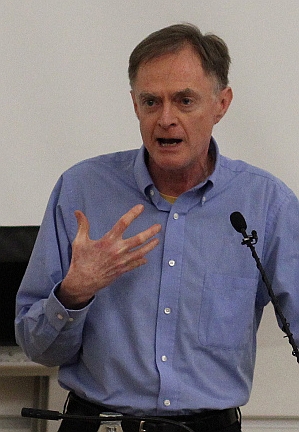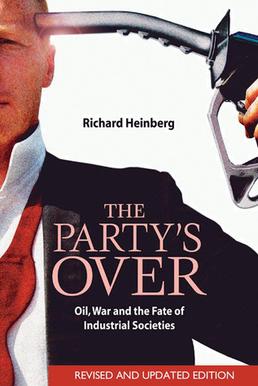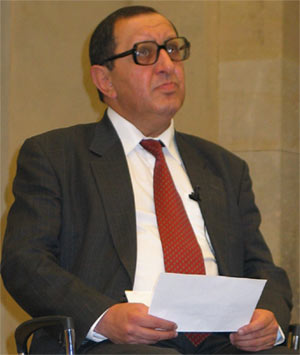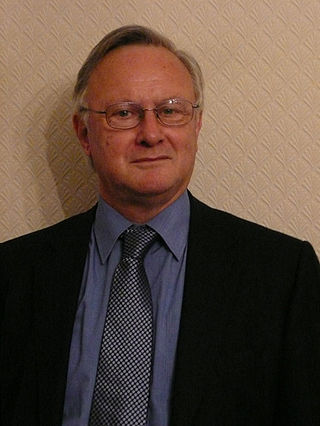The Hubbert curve is an approximation of the production rate of a resource over time. It is a symmetric logistic distribution curve, often confused with the "normal" gaussian function. It first appeared in "Nuclear Energy and the Fossil Fuels," geologist M. King Hubbert's 1956 presentation to the American Petroleum Institute, as an idealized symmetric curve, during his tenure at the Shell Oil Company. It has gained a high degree of popularity in the scientific community for predicting the depletion of various natural resources. The curve is the main component of Hubbert peak theory, which has led to the rise of peak oil concerns. Basing his calculations on the peak of oil well discovery in 1948, Hubbert used his model in 1956 to create a curve which predicted that oil production in the contiguous United States would peak around 1970.

Marion King Hubbert was an American geologist and geophysicist. He worked at the Shell research lab in Houston, Texas. He made several important contributions to geology, geophysics, and petroleum geology, most notably the Hubbert curve and Hubbert peak theory, with important political ramifications. He was often referred to as "M. King Hubbert" or "King Hubbert".

The Hubbert peak theory says that for any given geographical area, from an individual oil-producing region to the planet as a whole, the rate of petroleum production tends to follow a bell-shaped curve. It is one of the primary theories on peak oil.

Peak oil is the theorized point in time when the maximum rate of global oil production will occur, after which oil production will begin an irreversible decline. The primary concern of peak oil is that global transportation heavily relies upon the use of gasoline and diesel fuel. Switching transportation to electric vehicles, biofuels, or more fuel-efficient forms of travel may help reduce oil demand.

Colin J. Campbell was a British petroleum geologist who predicted that oil production would peak by 2007. He claimed the consequences of this are uncertain but drastic, due to the world's dependency on fossil fuels for the vast majority of its energy. His theories have received wide attention but are disputed and have not significantly changed governmental energy policies at this time. To deal with declining global oil production, he proposed the Rimini protocol.

Richard William Heinberg is an American journalist and educator who has written extensively on energy, economic, and ecological issues, including oil depletion. He is the author of 14 books, and presently serves as the senior fellow at the Post Carbon Institute.
The End of Suburbia: Oil Depletion and the Collapse of The American Dream is a 2004 documentary film concerning peak oil and its implications for the suburban lifestyle, written and directed by Toronto-based filmmaker Gregory Greene.

The Party’s Over: Oil, War and the Fate of Industrial Societies, by Richard Heinberg, is an introduction to the concept of peak oil and petroleum depletion.
Oil depletion is the decline in oil production of a well, oil field, or geographic area. The Hubbert peak theory makes predictions of production rates based on prior discovery rates and anticipated production rates. Hubbert curves predict that the production curves of non-renewing resources approximate a bell curve. Thus, according to this theory, when the peak of production is passed, production rates enter an irreversible decline.
Robert L. Hirsch is an American physicist who has been involved in energy issues from the late 1960s. Through the 1970s he directed the U.S. fusion energy program at a variety of government positions as responsibility for the project moved from the Atomic Energy Commission to the Energy Research and Development Administration and finally to the Department of Energy. After that time he was a senior energy program adviser for Science Applications International Corporation and is a Senior Energy Advisor at MISI and a consultant in energy, technology, and management.
Eugene Island block 330 oil field is an oil field in the United States Exclusive Economic Zone in the Gulf of Mexico. It is located 170 miles (270 km) southwest of New Orleans, 70–85 miles (113–137 km) off the Louisiana coast comprising six and a half leased blocks: Eugene Island 313, 314 south, 330, 331, 332, 337 and 338.

Ali Morteza Samsam Bakhtiari was an Iranian author and oil expert employed by the National Iranian Oil Company (NIOC). He held a number of senior positions with this organization beginning in 1971. He was also an adviser to the Oil Depletion Analysis Centre.

Chris Skrebowski is a well-known commentator on the oil industry and an expert on global oil supply. He is the founding Director of Peak Oil Consulting and consulting editor for Petroleum Review, the magazine of the UK Energy Institute. Skrebowski is also a founding member of the Association for the Study of Peak Oil and Gas (ASPO) and sits on the board of the Oil Depletion Analysis Centre (ODAC). He is a Fellow of the Energy Institute and advises the All Party Parliamentary Group on Peak Oil and Gas (APPGOPO).
Jean H. Laherrère is a French petroleum engineer and consultant, best known as the co-author of an influential 1998 Scientific American article entitled The End of Cheap Oil.
Dale Allen Pfeiffer is a geologist and writer from Michigan, U.S. who investigated and wrote about energy depletion and potential future resource wars. He also wrote about class war, sustainability, direct action and the environment. He is also an anarchist activist and a member of the Industrial Workers of the World. In 1999, he was one of the organizers of a hunger strike to provide medical care for the incarcerated Leonard Peltier.

The Oil Depletion Analysis Centre (ODAC) is an independent, UK-registered educational charity. The centre is working to raise international public awareness and promote better understanding of the world's oil depletion and peak oil problem. It is based in London and belongs to the New Economics Foundation.
Peak coal is the peak consumption or production of coal by a human community. Peak coal can be driven by peak demand or peak supply. Historically, it was widely believed that the supply-side would eventually drive peak coal due to the depletion of coal reserves. However, since the increasing global efforts to limit climate change, peak coal has been driven by demand. This is due in large part to the rapid expansion of natural gas and renewable energy. As of 2024 over 40% of all energy sector CO2 emissions are from coal, and many countries have pledged to phase-out coal.

Peak oil is the point at which oil production, sometimes including unconventional oil sources, hits its maximum. Predicting the timing of peak oil involves estimation of future production from existing oil fields as well as future discoveries. The most influential production model is Hubbert peak theory, first proposed in the 1950s. The effect of peak oil on the world economy remains controversial.
Post Carbon Institute (PCI) is a think tank which provides information and analysis on climate change, energy scarcity, and other issues related to sustainability and long term community resilience. Its Fellows specialize in various fields related to the organization's mission, such as fossil fuels, renewable energy, food, water, and population. Post Carbon is incorporated as a 501(c)(3) non-profit organization and is based in Corvallis, Oregon, United States.
Ugo Bardi is a professor of physical chemistry at the University of Florence.











